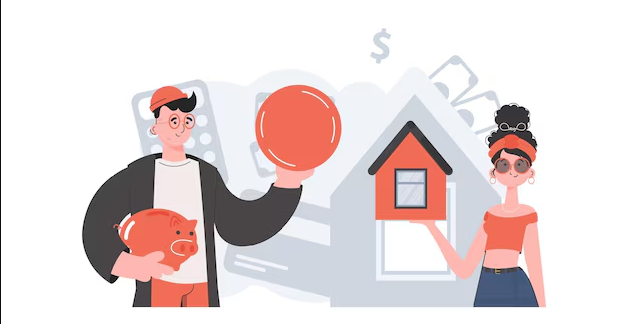Buying a first home is a significant milestone, one filled with excitement and anticipation. However, navigating the world of mortgage financing in the United States can be daunting, especially for first-time buyers. The process is laden with complexities that can lead to costly mistakes if not approached with care and knowledge.
Securing the right financing is crucial, as it directly impacts your financial health and the overall experience of homeownership. This article delves into the common pitfalls that first-time homebuyers face when seeking mortgage financing in the U.S., providing you with the insights needed to avoid these errors and make informed decisions.
Understanding Your Budget

One of the most common mistakes first-time homebuyers make is not fully understanding their budget before seeking financing. It’s easy to get caught up in the excitement of buying a home and be tempted to stretch your budget to buy your dream property. However, overshooting your budget can lead to significant financial strain down the road.
When you take on a mortgage that stretches your finances too thin, you’re left with little room for other essential expenses, such as home maintenance, insurance, and unexpected emergencies. This financial pressure can quickly turn the joy of homeownership into a burden. It’s crucial to be realistic about what you can afford, not just in terms of the mortgage payment but also considering property taxes, homeowner association fees, and utilities.
Before starting the home search, sit down and assess your financial situation. This includes evaluating your income, current debts, and long-term financial goals. Use mortgage calculators to get an idea of what you can realistically afford and ensure that you’re not exceeding that amount. Remember, it’s not just about qualifying for a loan; it’s about making sure you can comfortably manage all the associated costs of owning a home.
The Importance of Credit Score
Your credit score plays a pivotal role in the mortgage financing process. Unfortunately, many first-time buyers underestimate the impact of a low credit score on their mortgage options. A low score can lead to higher interest rates, which means you’ll pay more over the life of the loan, or worse, you may not qualify for a mortgage at all.
Lenders use your credit score to gauge your reliability as a borrower. A high credit score indicates that you’re likely to repay your loan on time, making you a lower risk for lenders. On the other hand, a low credit score suggests potential financial irresponsibility, leading lenders to protect themselves by offering loans with higher interest rates or requiring larger down payments.
To avoid this pitfall, it’s essential to check your credit score well before you start applying for mortgages. If your score is lower than you’d like, take steps to improve it. This could involve paying down existing debts, ensuring all your bills are paid on time, and correcting any errors on your credit report. Improving your credit score may take time, but it can significantly improve your mortgage terms, saving you thousands of dollars in the long run.
Your credit score doesn’t just influence whether you qualify for a mortgage; it also affects the type of loan products available to you. Borrowers with higher credit scores often have access to more favorable loan options, including those with lower interest rates, flexible repayment terms, and fewer fees. This can provide you with greater financial flexibility and reduce the overall cost of homeownership, allowing you to allocate funds to other priorities.
Additionally, your credit score impacts more than just the financial aspects of your mortgage—it can also affect your home-buying timeline. A poor credit score may require you to delay purchasing a home while you work on improving it. This delay could result in missed opportunities, especially in competitive real estate markets where home prices are rapidly increasing. By prioritizing your credit health early, you can position yourself for a smoother, more affordable home-buying process.
What First-Time Buyers Often Overlook
When planning for a mortgage, many first-time buyers focus solely on the down payment and monthly mortgage payments, overlooking other crucial costs. These hidden costs can add up quickly and, if not anticipated, can cause significant financial stress.
One of the most commonly overlooked costs is closing costs, which can range from 2% to 5% of the loan amount. These fees cover various expenses, including appraisal fees, title insurance, and attorney fees. Additionally, there are ongoing costs such as property taxes, homeowner’s insurance, and maintenance expenses that must be factored into your budget.
Another hidden cost that can catch new homeowners off guard is Private Mortgage Insurance (PMI). PMI is often required if your down payment is less than 20% of the home’s purchase price. This insurance protects the lender in case you default on the loan, but it adds an additional monthly expense to your mortgage payment.
To avoid being blindsided by these expenses, it’s important to do thorough research and consult with your lender about all potential costs associated with your mortgage. Make sure to budget for these costs to ensure you’re financially prepared for homeownership, beyond just the mortgage payments.
Securing financing for your first home in the U.S. is a complex and multifaceted process that demands careful planning and a deep understanding of potential pitfalls. Without proper preparation, what begins as an exciting milestone can quickly devolve into a financial nightmare, burdening you with unforeseen expenses and commitments.
The key to avoiding these common traps lies in a few critical areas: understanding your budget, maintaining a strong credit score, and being thoroughly aware of all the associated costs of homeownership, beyond just the mortgage payments.
Understanding your budget is paramount; overextending yourself financially can lead to significant strain and jeopardize your long-term financial health. A strong credit score is equally crucial, as it directly influences the terms of your mortgage, including interest rates and loan eligibility. Additionally, being aware of hidden costs, such as closing fees, property taxes, and maintenance expenses, ensures that you won’t be caught off guard by unexpected financial obligations.
By taking the time to educate yourself about these aspects and making informed decisions throughout the process, you can secure a mortgage that aligns with your financial situation. This thoughtful approach not only helps you avoid costly mistakes but also sets the foundation for a successful and stress-free homeownership experience, allowing you to fully enjoy this significant achievement.





